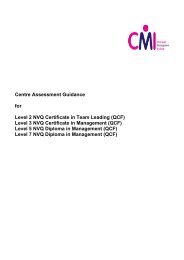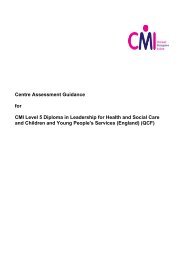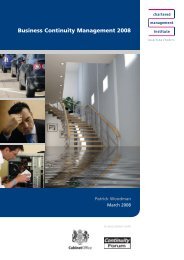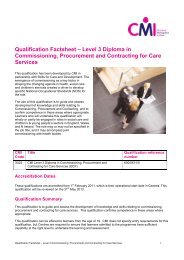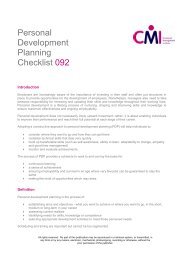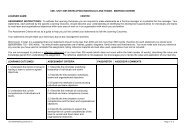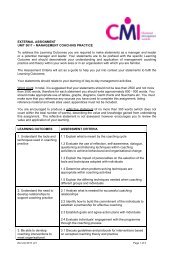Centre Assessment Guidance for CMI Level 3 Diploma in ...
Centre Assessment Guidance for CMI Level 3 Diploma in ...
Centre Assessment Guidance for CMI Level 3 Diploma in ...
Create successful ePaper yourself
Turn your PDF publications into a flip-book with our unique Google optimized e-Paper software.
<strong>Level</strong> 3 <strong>Diploma</strong> <strong>in</strong> Commission<strong>in</strong>g, Procurement and Contract<strong>in</strong>g <strong>Centre</strong> <strong>Assessment</strong> <strong>Guidance</strong>Title:Understand the process and experience of Dementia<strong>Level</strong>: 3 Unit Number: DEM301QCA UnitNumber:J/601/3538Credit value: 3 Guided Learn<strong>in</strong>gHours22Learn<strong>in</strong>g outcomes<strong>Assessment</strong> criteriaThe learner will:The learner can:1. Understand the neurology of dementia 1.1 Describe a range of causes of dementiasyndrome1.2 Describe the types of memory impairmentcommonly experienced by <strong>in</strong>dividuals withdementia1.3 Expla<strong>in</strong> the way that <strong>in</strong>dividuals process<strong>in</strong><strong>for</strong>mation with reference to the abilities andlimitations of <strong>in</strong>dividuals with dementia1.4 Expla<strong>in</strong> how other factors can causechanges <strong>in</strong> an <strong>in</strong>dividual’s condition that maynot be attributable to dementia1.5 Expla<strong>in</strong> why the abilities and needs of an<strong>in</strong>dividual with dementia may fluctuate2. Understand the impact of recognitionand diagnosis of dementia2.1 Describe the impact of early diagnosis andfollow up to diagnosis2.2 Expla<strong>in</strong> the importance of record<strong>in</strong>gpossible signs or symptoms of dementia <strong>in</strong> an<strong>in</strong>dividual <strong>in</strong> l<strong>in</strong>e with agreed ways of work<strong>in</strong>g2.3 Expla<strong>in</strong> the process of report<strong>in</strong>g possiblesigns of dementia with<strong>in</strong> agreed ways ofwork<strong>in</strong>g2.4 Describe the possible impact of receiv<strong>in</strong>g adiagnosis of dementia on• the <strong>in</strong>dividual• their family and friends3. Understand how dementia care must beunderp<strong>in</strong>ned by a person centred approach3.1 Compare a person centred and a nonperson centred approach to dementia care3.2 Describe a range of different techniquesthat can be used to meet the fluctuat<strong>in</strong>g abilitiesand needs of the <strong>in</strong>dividual with dementia3.3 Describe how myths and stereotypesrelated to dementia may affect the <strong>in</strong>dividualand their carers3.4 Describe ways <strong>in</strong> which <strong>in</strong>dividuals andVersion 1 – Feb 11 Page 44 of 73



